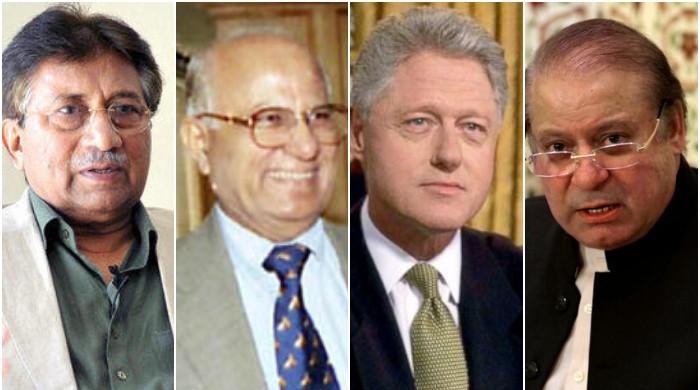- Dr. Ashraf’s book reveals several important facts.
- He was a former head of the PCB as well as the NCHD.
- The book will be launched tomorrow in Peshawar.
PESHAWAR: Dr Naseem Ashraf, former chairman of the Pakistan Cricket Board (PCB) and former head of the National Human Development Commission, has recounted in his upcoming book that the US State Department advised President Bill Clinton against visiting in Pakistan.
However, President Clinton decided to travel to Pakistan to prevent the execution of deposed Prime Minister Nawaz Sharif. The US president also held a secret meeting with Irshad Hassan Khan, then chief justice of Pakistan, to seek assurances that Nawaz would not be hanged.
He arrived in Pakistan for a few hours after receiving assurances from General Musharraf. Dr Ashraf expressed these thoughts in his book ‘Ring Side’, which will be launched in Peshawar tomorrow Tuesday, with additional launch events planned in various cities across Pakistan.
The book is published in Urdu under the title “Maidan-e-Amal”.
Regarding President Clinton’s visit to Pakistan, he revealed that Clinton went to the bathroom during a lunch hosted by Musharraf.
Moments later, ex-CJP Irshad also went to the toilet, where they spoke for five minutes. President Clinton asked the CJP if Nawaz would be sentenced to death, to which Judge Hassan assured him that would not happen.
This incident can be considered an important and revealing historical event.
Dr. Ashraf noted that Dr. Musadik Malik, a member of Shahbaz Sharif’s cabinet, left a lucrative job in the United States to return to Pakistan and work in human development, emphasizing that he is a very patriotic Pakistani.
He termed former Prime Minister Imran Khan’s visit to the United States in 2019 as successful, saying it strengthened relations between Pakistan and the United States.
Dr. Ashraf recounted a meeting he had with former Indian Prime Minister Manmohan Singh during General Musharraf’s visit to India, during which Singh confirmed that he had sent two tonnes of gold to the Bank of England to guarantee a loan, as it was not in favor of going to the IMF.
Thanks to the loan obtained from the Bank of England, he initiated a new economic policy in India.
Dr. Ashraf wrote about Khan’s ex-wife Jemima Khan, stating that she had sacrificed everything for Pakistan and was a commendable humanitarian.
He considers the National Commission for Human Development as one of his great achievements, highlighting its important role in promoting education and reducing poverty.
However, as president, he faced many challenges, even considering resigning at one point. The success of the program can be measured by the fact that Tony Blair’s son, Nicholas Blair, came to Pakistan specifically for an internship.
Regarding Pakistan-US relations, Dr Ashraf commented on several points, saying that the events of 9/11 shook the US, which is why it targeted Afghanistan.
Nonetheless, he acknowledged that President Musharraf had assured President George W. Bush of his full cooperation, agreeing to five of the seven requests. If Pakistan had not complied, it would have faced economic ruin, detrimental to national security.
Dr. Ashraf clarified that Pakistanis living in the United States are defenders of democracy and patriotic citizens who have stood by Pakistan in difficult times.
Therefore, when Nawaz was ousted, protests were held for his reinstatement, advertisements were placed in newspapers and letters were written to members of Congress and the US President, which ultimately led to the President Clinton’s visit to Pakistan.
As the Chairman of the Pakistan Cricket Board, Dr Ashraf included his memories in the book, sharing that Younis Khan had visited the then Chairman Sheryar Khan but due to a delayed meeting, he announced his resignation before an important tour.
He said he was happy that, at his request, Younis had agreed to lead the national team.
He also revealed that although Shoaib Akhtar and Mohammad Asif tested positive for doping, there was no proven wrongdoing on the part of the players, for which the cricket board made constructive efforts.
He mentioned that as the chairman of the Pakistan Cricket Board, he faced challenges head on and is happy that 19 stadiums have been built across the country.
Dr Ashraf addressed the boycott of the Test match, noting that Inzamam-ul-Haq initially refused to play the Test oval, but later agreed due to the intervention of General Musharraf, but the umpires later refused.
Originally published in The News




